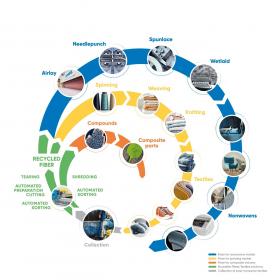Fashion for Good: Ten new innovators for 2024 programme
Building on a renewed five-year strategy, Fashion for Good selects ten new innovators for its 2024 programme to receive tailored support validating their technologies. This cohort represents an increased focus on novel footwear material and recycling technologies, man-made cellulosics, and nylon recycling.
The 2024 Innovation Programme provides support based on the development stage and ambitions of each innovator, matching them with relevant industry partners to drive technology and impact technology and impact validation as well as investing activities.
The selected innovators joining the 2024 Innovation Programme are:
- Algreen Ltd: Algreen co-develops alternative materials from algae and biobased sources that can replace fossil-based products such as PU.
- Balena: Balena creates biodegradable partly biobased polymers for footwear outsoles.
- Epoch Biodesign: Epoch Biodesign is an enzymatic recycler of PA66 and PA6 textile waste.
- Fibre52: Fibre52 is a bio-based solution replacing traditional bleach prepared-for-dyeing and dye processes.
- Gencrest BioProducts Pvt Ltd: Gencrest works with various agri-residues to convert them into textile-grade fibres using their enzymatic technology.
- HeiQ AeoniQ: HeiQ AeoniQ™ is a continuous cellulose filament yarn with enhanced tensile properties.
- Nanollose - Nullabor: Nullarbor™Lyocell is developed from microbial cellulose which is converted into pulp pulp to produce a lyocell fibre with their partner Birla Cellulose.
- REGENELEY: REGENELEY pioneers advanced shoe sole recycling technologies by separating and recycling EVA, TPU, and rubber components found in footwear.
- Samsara Eco: Samsara Eco is an enzymatic recycler of PA66 and PET textile waste.
- SEFF: SEFF Fibre produces cottonised fibres and blends of hemp fabrics utilising a patented HVPED process.
Fashion for Good





























